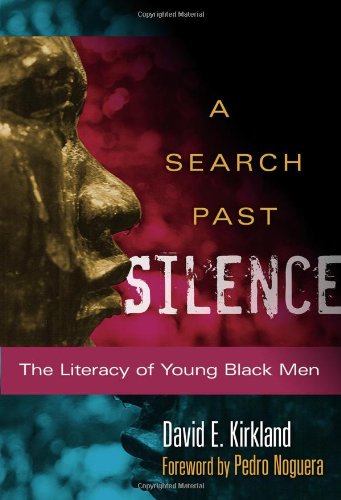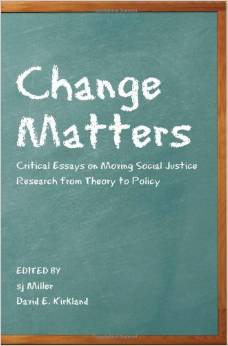Dr. David E. Kirkland
New York University,
New York, USA
“A Song of the Smoke:
Critical Thoughts on the Literacies of Young Black Men”
September 14, 2014, 7:00 p.m.
Eastern time zone/New York/USA
Dr. Kirkland’s seminar is based on a decade of research aimed at understanding the complexities of Black male social life and the myriad forces influencing their literacy development. The goal of the presentation is to raise awareness to the effects of educational injustice in the lives of Black males in order to find ways to intervene and interrupt cycles of miseducation. What are the forces at play (e.g., gangs, peer pressure, poverty) competing for the attention of young Black men? How their literacies shaped? How might cycles of inequity influence how, why, and what Black males learn about literacy within schools and beyond? How might educators disrupt the cycles of inequity so that Black males might become empowered to transform their communities, their lives, their educational.
David E. Kirkland is a bestselling author, activist, cultural critic, educator, researcher, and thinker. He is also an associate professor of English and urban education at New York University. His transdisciplinary scholarship examines the intersections among language, race, gender, and urban youth culture under the lens of literacy. His work has also explored, among other things, urban teacher preparation, digital media and technology, and the sociopolitical aesthetics of revolutionary justice as (re)produced in artifacts of popular Black culture. He has spent the past decade analyzing the culture, language, and texts of groups of urban American youth, and has expertise in critical literary, linguistic, and ethnographic research methods. He has received many awards for his groundbreaking work including an NAEd/Spencer Foundation Postdoctoral Fellowship Award, a Ford Foundation Postdoctoral Fellowship Award, a NCTE Cultivating New Voices Fellowship Award, the 2006 AERA Division G Dissertation Award, among many others. He has published widely. Dr. Kirkland believes that, in their language and literacies, youth take on new meanings beginning with a voice and verb, where words when spoken or written have the power to transform the world inside-out. Access Dr. Kirkland’s website.
His recent book A search past silence: The literacy of young Black men argues that educators need to understand the social worlds and complex literacy practices of African-American males in order to pay the increasing educational debt we owe all youth and break the school-to-prison pipeline. Moving portraits from the lives of six friends bring to life the structural characteristics and qualities of meaning-making practices, particularly practices that reveal the political tensions of defining who gets to be literate and who does not.
Key chapters on language, literacy, race, and masculinity examine how the literacies, languages, and identities of these friends are shaped by the silences of societal denial. Ultimately, A Search Past Silence is a passionate call for educators to listen to the silenced voices of Black youth and to re-imagine the concept of being literate in a multicultural democratic society.
Another book Change matters: Critical essays on moving social justice research from theory to policy edited by Dr. David E. Kirkland committed to social justice in English education, provides researchers, university instructors, and preservice and inservice teachers with a framework that pivots social justice toward policy. The chapters in this volume detail rationales about generating social justice theory in what Freire calls «the revolutionary process» through essays that support research about teaching about the intersections between teaching for social change and teaching about social injustices, and directs us toward the significance of enacting social justice methodologies. The text unpacks how education, spiritual beliefs, ethnicity, age, gender, ability, social class, political beliefs, marital status, sexual orientation, gender expression, language, national origin, and education intersect with the principles by which we live and the multiple identities that we embody as we move from space to space. This book is critical reading for anyone who strives to cease inequitable schooling practices by conducting research in education to inform more just policies.
Selected Publications
Journal Articles
Paris, D., & Kirkland, D. E. (2011). The consciousness of the verbal artist”: Understanding vernacular literacies in digital and embodied spaces. Urban literacies: Critical perspectives on language, learning, and community, 177-194.
Kirkland, D. E. (2009). The skin we ink: Tattoos, literacy, and a new English education. English Education, 41(4), 375-395.
Kirkland, D. E. (2009). Standpoints: Researching and teaching English in the digital dimension. Research in the Teaching of English, 44(1), 8-22.
Kirkland, D. E. (2008). “The rose that grew from concrete”: Postmodern blackness and new English education. English Journal, 97(5), 69-75.
Kirkland, D. (2008). Shaping the digital pen: Media literacy, youth culture, and MySpace. Youth Media Reporter, 2(4), 188-200.
Kirkland, D. E. (2008). “You must learn”: Promoting hip-hop education. Youth Media Reporter, 2(3), 42-46.
Zhao, Y., Zhang, G., Yang, W., Kirkland, D., Han, X., & Zhang, J. (2008). A comparative study of educational research in China and the United States. Asia Pacific Journal of Education, 28(1), 1-17.
Books
Kirkland, D. E. (2013). A search past silence: The literacy of young Black men. Teachers College Press.
Kirkland, D. E. (Ed.). (2010). Change matters: Critical essays on moving social justice research from theory to policy (Vol. 1). New York, NY: Peter Lang.
Chapters in Books
Kirkland, D. E. (2014). Urban literacy learning. In H. R. Milner IV, K. Lomotey (Eds.), Handbook of urban education (pp. 394-411). New York, NY: Routledge.
Kirkland, D. E. (2013). Investing masculinity. In B. J. Guzzetti, & T. W. Bean (Eds.), Adolescent literacies and the gendered self:(re) constructing Identities through multimodal literacy practices (pp. 131-139). New York, NY: Routledge.
Kirkland, D. E. (2011). “Something to brag about”: A discourse perspective on urban adolescent black males and literacy. In A.F. Ball, & C.A. Tyson, (Eds.). (2011). Studying diversity in teacher education (pp. 183-200). Rowman & Littlefield.
Kirkland, D. E. (2010). 4 colored girls who considered suicide/When social networking was enuf. In D.E. Alvermann (Ed.), Adolescents’ online literacies: Connecting classrooms, digital media, and popular culture (pp. 71-88). New York, NY: Peter Lang International Academic Publishers.
Kirkland, D., & Jackson, A. (2009). Instructional approaches and students’ attitudes: Toward a critical approach to language instruction for other people’s children. In J. Scott, D. Y. Straker, & L. Katz (Eds.), Affirming students’ right to their own language: Bridging educational policies and language/Language Arts Teaching Practices (pp. 132-175). Champagne/Urbana, IL: NCTE/LEA.











